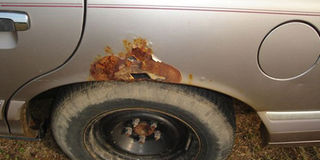How do I control rust?

Rusted car
What you need to know:
I own a Carina E 1.8L, 7A FE, in good condition with 171,000km. I have sprayed under the carriage and I also wash and wax, often spray anti rust FK 40 (WD-40) where I spot rust. I want it to last but is it is parked most of the time
Hello Paul, I own a Carina E 1.8L, 7A FE, in good condition with 171,000km. I have sprayed under the carriage and I also wash and wax, often spray anti rust FK 40 (WD-40) where I spot rust. I want it to last but is it is parked most of the time.
How do I prevent rust inside the exhaust pipe? (welded it a year ago)
How do I protect rubber hoses, radiator hoses in the engine bay?
Are exterior engine cleaner or degreaser available Kampala? If so which one?
Best choice of engine oil for my high mileage car.
What about additives to fuel? Do you use them?
Jammie from Kigali
Hello Jammie, giving your car extra attention and following a maintenance routine will keep your car in good affordable condition for a long time.
1. Preventing rust or corrosion damage in the exhaust system is challenging for cars which are parked most of the time or run for short distances. Unburnt fuel or after burn moisture in the exhaust is very corossive and tends to settle in the silencer or pipe. Regular long trips help burn exhaust moisture to prevent corrosion damage. Buying high quality stainless or galvanised steel exhaust pipes can prevent rust damage. Regular cleaning after driving through muddy roads can also reduce rust buildup. Switch to Shell V-Power petrol which is blended with anti-corrosion molecules to prevent fuel system and exhaust pipe corrosion damage.
2 and 3. You can protect your engine rubber hoses by degreasing them with a light detergent and water solution of engine degreasers at leading malls. Preventing oil leakages from aged engine seals helps to minimise this problem.
4. High mileage engines should use multigrade mineral engine oils with a viscosity index of 15W40. When your engine shows signs of leaking or burning a lot of oil then you can resort to the heavier monograde oils like SAE 40 which are designed with better sealing properties.
5. Fuel additives are usually designed to clean your engine intake valves for better protection. You do not need to use on shelf fuel additives because the Shell fuels are blended with tripple action additives for detergency (cleaning) , friction modifiers which make the engine pistons run lighter or more fuel efficiently and performance enhancers such as Shell V-Power’s high octane formula.




